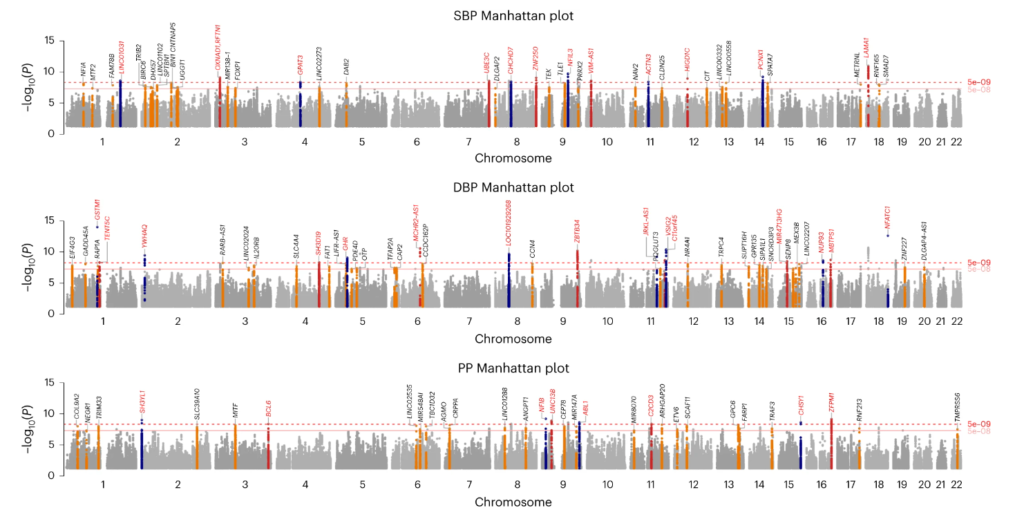Researchers of over 100 universities across the world finalized the results of the joint work. It was the largest study ever done in genetic foundations of blood pressure. The study provides the full answer to the question ‘Is high blood pressure genetic‘. To answer it, the researchers analyzed data from over one million people. They identified over 2,000 genetic signals, including 113 newly discovered genomic loci, that affect blood pressure.
Genetic signal and genetic locus?
Think of a “genetic signal” like a clue in a detective story. He tells you something about a person’s genetic makeup. Genomic locus is singular of loci, that is a plural form. It is like a specific address on a very long street.In this case it is a chromosome inside your cells. Each chromosome is like a street filled with houses, and each house, or locus, has a specific number. At each of these addresses, there can be different things. It might be a house which is like a gene. It might be a park which could be an area that helps control when the gene is active or not. Or it might be an empty lot, which could be a piece of DNA that doesn’t seem to do much. Or maybe it has a role we don’t fully understand yet.
Is high blood pressure genetic: the study design
The study was supported by the National Institute for Health and Care Research (NIHR). This research was a collaboration across multiple institutions and used data from genome-wide association studies. These population-level studies together examined the genetic makeup of large groups of people. They aimed to identify genetic variants linked to blood pressure and hypertension. To achieve it, the researchers merged four large datasets. The findings of this study describe a complex network of genetic factors that are involved in blood pressure levels. The project involved collaboration of over 140 investigators from more than 100 universities, institutes, and government agencies worldwide.
Dr. Helen Warren, the Senior Lecturer in Statistical Genetics at Queen Mary University of London, said:
“We have now revealed a much larger proportion of the genetic contribution to blood pressure than was previously known.”
Is blood pressure genetic? How this study can be used
Experts believe that this study will advance precision medicine in early detection and prevention of hypertension.
Also, the study paves the way for innovative treatment and prevention strategies that could significantly impact public health. But the most interesting part is the development of polygenic risk scores.
Genetic risk scores
The study has also formulated polygenic risk scores. They combine effects of numerous genetic variants. The aim is to predict an individual’s blood pressure and risk for developing hypertension.
People with the highest genetic risk showed systolic blood pressure levels about 17 mmHg higher than those with the lowest genetic risk. It means that they face a sevenfold increased risk of developing hypertension.
The study’s senior author Professor Patricia Munroe said:
“Our results provide new resources for understanding biological mechanisms and importantly, new polygenic risk scores for early identification and stratification of people at risk for cardiovascular diseases.”
What is a polygenic risk score
Imagine you’re at a carnival and there’s a game that tries to guess your talent in basketball. Instead of just measuring how tall you are, the game also looks at many other factors like your hand-eye coordination, speed, strength, and past game performances. By considering all these different factors, the game gives you a score that predicts how good you might be at basketball.
A polygenic risk score works in a similar way, but for your health. Instead of looking at just one gene, it considers many genes throughout your DNA that could influence your risk of developing certain diseases. Each of these genes might only have a tiny effect on its own, just like how being a little faster doesn’t make you a great basketball player by itself. But when you add up all these little effects from many genes, you get a score that helps predict your risk of diseases like heart disease, diabetes, or even some types of cancer.
This score doesn’t say for sure that you will or won’t get a disease, just like the carnival game can’t guarantee you’ll be a basketball star. But it gives a clue about your chances, which can be really helpful. Doctors and researchers use these scores to understand more about who might be at higher risk for certain conditions and to guide decisions about things like lifestyle changes or monitoring that might help keep you healthy.
Limitations and source link
This study presented the usual limitation, most of the data came from the people of the European ancestry. However, the relevance for people of the African ancestry was confirmed, by inclusion of data from the National Institute of Health’s All of Us Research Program.
The study is published in the journal Nature Genetics.






